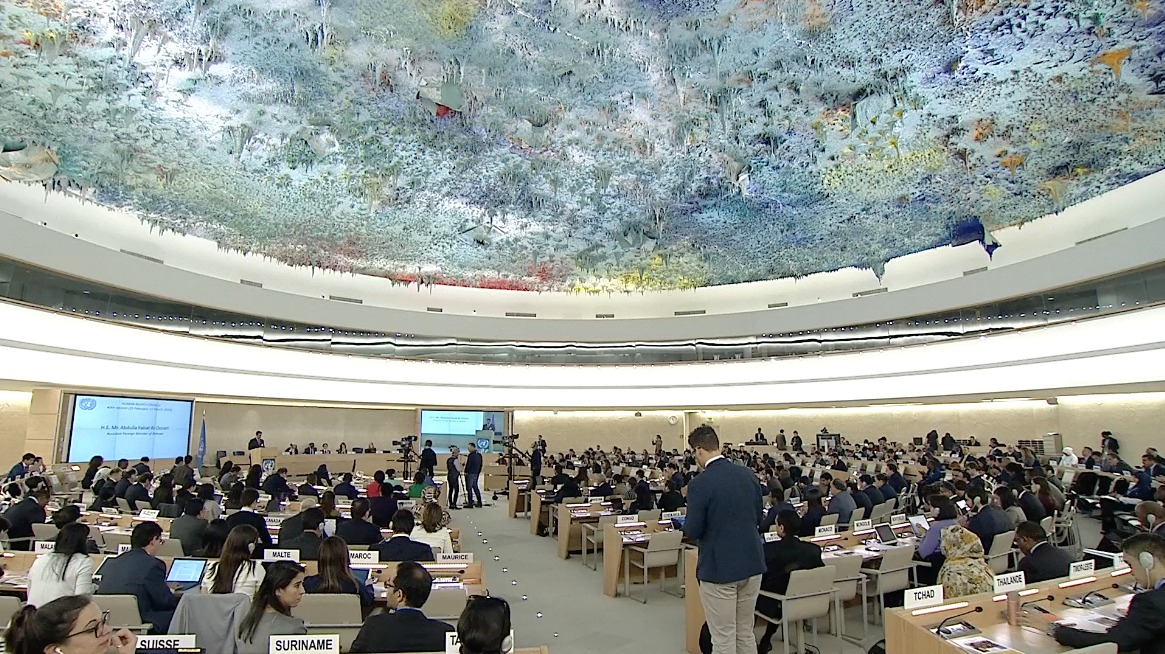27 February 2019 — Americans for Democracy & Human Rights in Bahrain (ADHRB) takes this opportunity to respond to the statement made today by Adel Bin Ahmed Al-Jubeir, Saudi Arabia’s Minister of State for Foreign Affairs, during the High-Level Segment of the 40th session of the United Nations Human Rights Council (HRC). During his speech, Al-Jubeir touted Saudi Arabia’s human rights record, including its steps in addressing terrorism and regional threats, its work to reform domestic conditions for women, and ensure fair trials. However, these comments obscure deep-seated and systematic human rights violations. We express our deep concern over these violations, in particular the arrests and detentions of women rights activists, journalists, dissidents, restrictions on religious freedom, free expression, assembly, and association, the use of capital punishment, and the war in Yemen.
The War in Yemen
In his speech, Al-Jubeir discussed the war in Yemen, claiming that Saudi Arabia’s involvement is internationally sanctioned and highlighting the country’s monetary, political, and humanitarian relief efforts in support of the Yemeni people. This statement belies Saudi Arabia’s role as an instigator in the conflict and a main reason why Yemen requires international humanitarian support. Indeed, due to Saudi Arabia’s involvement in the war in Yemen, from March 2015 to 23 August 2018, at least 6,660 civilians have been killed and 10,563 injured. According to the Office of the High Commissioner for Human Rights (OHCHR) most of the civilian casualties are the result of Saudi-led airstrikes.
Saudi Arabia’s airstrikes have not only killed thousands of non-combatants, but have devastated Yemen, with bombs falling on “residential areas, markets, funerals, weddings, detention facilities, civilian boats and even medical facilities.” These attacks on Yemen’s infrastructure have severely impaired the country’s water supply system, which in turn has led to an increased risk of further cholera outbreaks. This risk increased by three-fold since the Saudi-led coalition began to attack the critical port city of Hodeidah. Children are among those most at risk from cholera, and they have already been among those who have felt the brunt of the conflict. Since Saudi Arabia and its coalition partners intervened in Yemen in March 2015, over 85,000 children have died of hunger.
Women Rights Defenders
In addition to Yemen, Al-Jubeir highlighted what Saudi Arabia has termed “reforms” in particular in the field of women’s rights. However, he failed to note that even as Crown Prince Mohammed bin Salman has talked about modernizing the country and empowering women, security forces have systematically arrested and detained over a dozen of women’s rights activists. While the government lifted the women’s driving ban in mid-2018, the government has silenced and imprisoned many of the activists who had called for this move. Recently, there have been credible allegations these activists have been tortured and sexually abused during their interrogations.
Journalists
In discussing the kingdom’s reform efforts, Al-Jubeir also neglected to mention the kingdom’s sharp restrictions on free expression and its imprisonment of journalists. According to the Committee to Protect Journalists, the Saudi government has imprisoned at least 16 journalists, including 13 journalists in 2017 and 2018. Among the journalists who are in prison are Raif Badawi, Saleh al-Shehi, Nadhir al-Majid, Nouf Abdulaziz, and Wajdi al-Ghazzawi. While the Saudi government has long restricted free expression and criminalized forms of dissent, the murder of expatriate journalist Jamal Khashoggi in the kingdom’s consulate in Istanbul, Turkey in November 2018 has attracted global concern and scrutiny.
Executions
In his remarks, Al-Jubeir claimed that Saudi Arabia ensures fair trials, but this remark dismisses concerns about the lack of due process guarantees, allegations of torture, and a judicial system rigged in favor of the government, as well as the application of capital punishment against peaceful dissidents. The Saudi government is among the more frequent executioners in the world and according to Human Rights Watch, has carried out nearly 600 executions since the beginning of 2014. In 2016, the government executed at least 154 people, recorded 146 executions in 2017, and 139 in 2018. While the majority of executions are for convictions of violent crimes and drug offenses, the kingdom also executes dissidents. Among those who are at risk of execution due to dissent are Ali al-Nimr, Dawood al-Marhoon, Abdullah al-Zaher. Al-Nimr, al-Marhoon, and al-Zaher were minors when the government alleged they had committed terror crimes. They were tortured and sentenced to death and are at imminent risk of capital punishment. Women’s rights activist Israa al-Ghomgham was also at risk of execution until the authorities confirmed on 31 January 2019 that they would not seek her execution. She would have become the first woman activist executed for peaceful activism in what would have set a dangerous precedent for other women activists behind bars.
Conclusions
Contrary to Al-Jubeir’s statement on Saudi Arabia’s progress in the promotion and protection of human rights, the government has not shown it is serious about embarking on necessary reforms to prioritize respect for human rights. ADHRB condemns Al-Jubeir’s remarks and calls upon the Saudi government to bring its domestic laws into compliance with international human rights standards and international human rights treaties and to release all political prisoners of conscience. We further call on Saudi Arabia to empower an independent and impartial investigatory mechanism to examine concerns about human rights violations.





